M.I. Lastman's Blog, page 6
June 29, 2015
Aforementioned: aphorisms and questions for 2015
Jellyfish = ½ billion yrs, homo sapiens non sapiens = ¼ million yrs - Jellyfish wins 
 Rembrandt's great painting of Aristotle contemplating the bust of Homer speaks volumes about his reverence for human intelligence. However, while there is no way to prove this absolutely, it seems likely that some species of jellyfish have been around, morphologically unchanged, for more than a half billion years. The same could not be said of humans. We now appear about to exit after only a quarter million years, taking the rest of life with us. Somehow, this doesn't seem to add up to great intelligence.
Rembrandt's great painting of Aristotle contemplating the bust of Homer speaks volumes about his reverence for human intelligence. However, while there is no way to prove this absolutely, it seems likely that some species of jellyfish have been around, morphologically unchanged, for more than a half billion years. The same could not be said of humans. We now appear about to exit after only a quarter million years, taking the rest of life with us. Somehow, this doesn't seem to add up to great intelligence.

 Rembrandt's great painting of Aristotle contemplating the bust of Homer speaks volumes about his reverence for human intelligence. However, while there is no way to prove this absolutely, it seems likely that some species of jellyfish have been around, morphologically unchanged, for more than a half billion years. The same could not be said of humans. We now appear about to exit after only a quarter million years, taking the rest of life with us. Somehow, this doesn't seem to add up to great intelligence.
Rembrandt's great painting of Aristotle contemplating the bust of Homer speaks volumes about his reverence for human intelligence. However, while there is no way to prove this absolutely, it seems likely that some species of jellyfish have been around, morphologically unchanged, for more than a half billion years. The same could not be said of humans. We now appear about to exit after only a quarter million years, taking the rest of life with us. Somehow, this doesn't seem to add up to great intelligence.
Published on June 29, 2015 09:58
June 28, 2015
Aforementioned: aphorisms and questions for 2015
Orderly reduction of human population→more room for restored biomes→increased biological carbon sequestration.
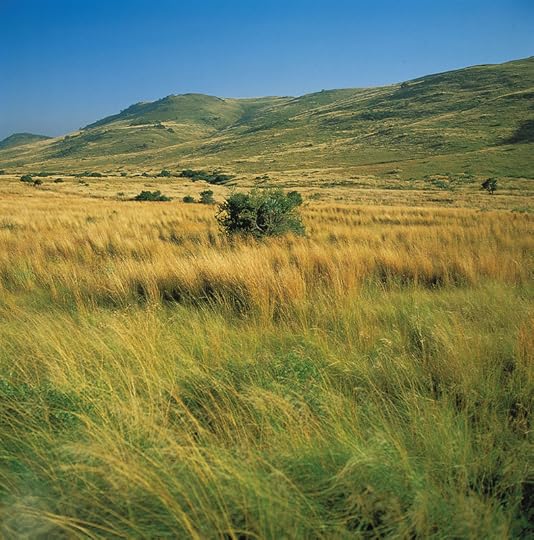
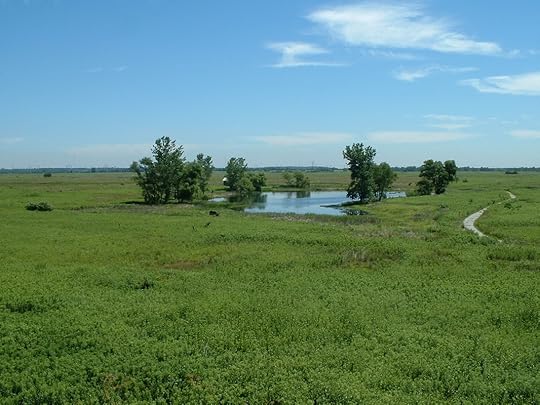

 The prairie biome is shown here because it is one of the most drastically despoiled of all. Many things might be done to enhance it as a natural carbon sink, even in those vast parts of it now devoted to one form or another of agriculture. However, as our population begins to decrease we may magnify the value of marginal agricultural areas as biological carbon sinks when they are no longer required for food production.
The prairie biome is shown here because it is one of the most drastically despoiled of all. Many things might be done to enhance it as a natural carbon sink, even in those vast parts of it now devoted to one form or another of agriculture. However, as our population begins to decrease we may magnify the value of marginal agricultural areas as biological carbon sinks when they are no longer required for food production.



 The prairie biome is shown here because it is one of the most drastically despoiled of all. Many things might be done to enhance it as a natural carbon sink, even in those vast parts of it now devoted to one form or another of agriculture. However, as our population begins to decrease we may magnify the value of marginal agricultural areas as biological carbon sinks when they are no longer required for food production.
The prairie biome is shown here because it is one of the most drastically despoiled of all. Many things might be done to enhance it as a natural carbon sink, even in those vast parts of it now devoted to one form or another of agriculture. However, as our population begins to decrease we may magnify the value of marginal agricultural areas as biological carbon sinks when they are no longer required for food production.
Published on June 28, 2015 09:21
June 27, 2015
Aforementioned: aphorisms and questions for 2015
If no naturally productive farmland, no bio-diversity, no forests, no pure fresh air, no safe fresh water, no fish - then what?@pdeppisch
http://goo.gl/Ueodsq
This blog is based on a question by Peter Deppisch. It is the only one we should be asking as we approach the Paris Summit on Climate Change. Most will likely simply answer by claiming the question is alarmist. But is it, really? Each of those domains is diminishing more precipitously every year under the relentless pressures of our growing population and of our science and technology. So far, all our efforts to stem this tide by technology (solar panels etc.) have done no more than make it a little less bad. All this slippage would respond immediately to a humane and orderly reduction in the vastly disproportionate size of our species and to concentrated efforts to restore natural biomes as enhanced carbon sinks. Remember that the more of us, the more unlikely the second part of the previous sentence becomes.
This blog is based on a question by Peter Deppisch. It is the only one we should be asking as we approach the Paris Summit on Climate Change. Most will likely simply answer by claiming the question is alarmist. But is it, really? Each of those domains is diminishing more precipitously every year under the relentless pressures of our growing population and of our science and technology. So far, all our efforts to stem this tide by technology (solar panels etc.) have done no more than make it a little less bad. All this slippage would respond immediately to a humane and orderly reduction in the vastly disproportionate size of our species and to concentrated efforts to restore natural biomes as enhanced carbon sinks. Remember that the more of us, the more unlikely the second part of the previous sentence becomes.
Published on June 27, 2015 07:59
June 26, 2015
Aforementioned: aphorisms and questions for 2015
Growing in the growth economy: population, wealth disparity, poverty, garbage, the bit stream, CO2, hunger. 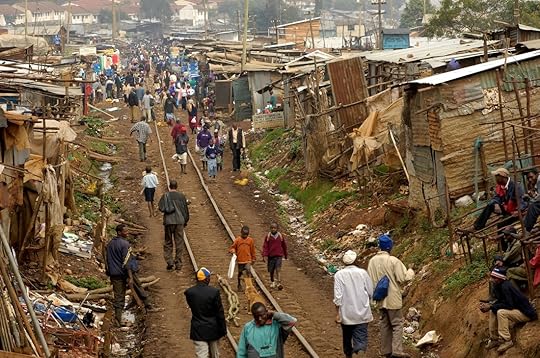


 Politicians, economists, almost everyone seem addicted to the idea of growth. The pursuit of a growth economy doesn't appear to be doing us much good. In fact, the consequences of the pursuit of growth are so catastrophic that maybe we should be pursing alternatives as a priority.
Politicians, economists, almost everyone seem addicted to the idea of growth. The pursuit of a growth economy doesn't appear to be doing us much good. In fact, the consequences of the pursuit of growth are so catastrophic that maybe we should be pursing alternatives as a priority.
The last picture represents the unconsidered growth of what may be best described as magic. Here it is typified by the exponential growth of the digital bit stream, whose corollary is the shrinkage of real opportunity for the rapidly growing population.



 Politicians, economists, almost everyone seem addicted to the idea of growth. The pursuit of a growth economy doesn't appear to be doing us much good. In fact, the consequences of the pursuit of growth are so catastrophic that maybe we should be pursing alternatives as a priority.
Politicians, economists, almost everyone seem addicted to the idea of growth. The pursuit of a growth economy doesn't appear to be doing us much good. In fact, the consequences of the pursuit of growth are so catastrophic that maybe we should be pursing alternatives as a priority.The last picture represents the unconsidered growth of what may be best described as magic. Here it is typified by the exponential growth of the digital bit stream, whose corollary is the shrinkage of real opportunity for the rapidly growing population.
Published on June 26, 2015 07:57
June 25, 2015
Aforementioned: aphorisms and questions for 2015
The biosphere: death by 10 sextillion bits. Reuse; buy local; pay cheerfully for labour. 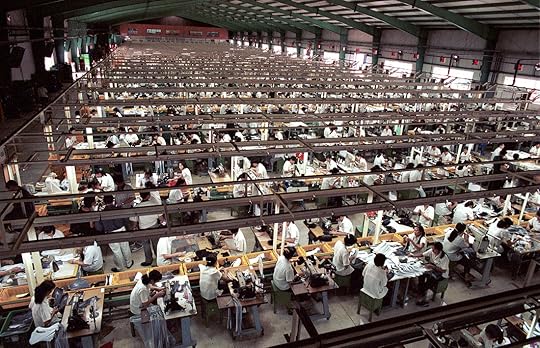


 As with everything connected with the crisis of the biosphere this blog introduces questions that are extremely difficult to answer. What happens to all of the jobs that these people have if they stop making bits? The flea market in third picture mostly contains bits that will enter the bit stream. What does re-use really do to stem the rushing flood of the bit stream? What steps to we need to take to stem the bit stream? Can we really feed ourselves locally? What can we do to make the promise of the fourth picture a reality? How do we convince ourselves that labour is honourable, fulfilling, and deserving of rewarding compensation?
As with everything connected with the crisis of the biosphere this blog introduces questions that are extremely difficult to answer. What happens to all of the jobs that these people have if they stop making bits? The flea market in third picture mostly contains bits that will enter the bit stream. What does re-use really do to stem the rushing flood of the bit stream? What steps to we need to take to stem the bit stream? Can we really feed ourselves locally? What can we do to make the promise of the fourth picture a reality? How do we convince ourselves that labour is honourable, fulfilling, and deserving of rewarding compensation?



 As with everything connected with the crisis of the biosphere this blog introduces questions that are extremely difficult to answer. What happens to all of the jobs that these people have if they stop making bits? The flea market in third picture mostly contains bits that will enter the bit stream. What does re-use really do to stem the rushing flood of the bit stream? What steps to we need to take to stem the bit stream? Can we really feed ourselves locally? What can we do to make the promise of the fourth picture a reality? How do we convince ourselves that labour is honourable, fulfilling, and deserving of rewarding compensation?
As with everything connected with the crisis of the biosphere this blog introduces questions that are extremely difficult to answer. What happens to all of the jobs that these people have if they stop making bits? The flea market in third picture mostly contains bits that will enter the bit stream. What does re-use really do to stem the rushing flood of the bit stream? What steps to we need to take to stem the bit stream? Can we really feed ourselves locally? What can we do to make the promise of the fourth picture a reality? How do we convince ourselves that labour is honourable, fulfilling, and deserving of rewarding compensation?
Published on June 25, 2015 10:13
June 24, 2015
Aforementioned: aphorisms and questions for 2015
Let’s talk about replacing the GDP index with a Gross Domestic Restoration index GDR 


 Restoration may not be a terrific way to put money in the pockets of the very wealthy, but it is vastly better at giving meaningful work to those who need it. Everything in the first picture is designed to minimize human labour. Replanting forests, rebuilding wetlands, consolidating contaminated soils, cleaning up shorelines are all meaningfully labour intensive activities.
Restoration may not be a terrific way to put money in the pockets of the very wealthy, but it is vastly better at giving meaningful work to those who need it. Everything in the first picture is designed to minimize human labour. Replanting forests, rebuilding wetlands, consolidating contaminated soils, cleaning up shorelines are all meaningfully labour intensive activities.



 Restoration may not be a terrific way to put money in the pockets of the very wealthy, but it is vastly better at giving meaningful work to those who need it. Everything in the first picture is designed to minimize human labour. Replanting forests, rebuilding wetlands, consolidating contaminated soils, cleaning up shorelines are all meaningfully labour intensive activities.
Restoration may not be a terrific way to put money in the pockets of the very wealthy, but it is vastly better at giving meaningful work to those who need it. Everything in the first picture is designed to minimize human labour. Replanting forests, rebuilding wetlands, consolidating contaminated soils, cleaning up shorelines are all meaningfully labour intensive activities.
Published on June 24, 2015 07:31
June 23, 2015
Aforementioned: aphorisms and questions for 2015
The plague of homo sapiens is biological and looks to be fatal. 
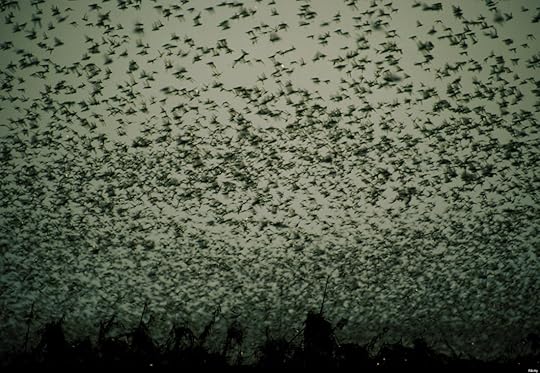

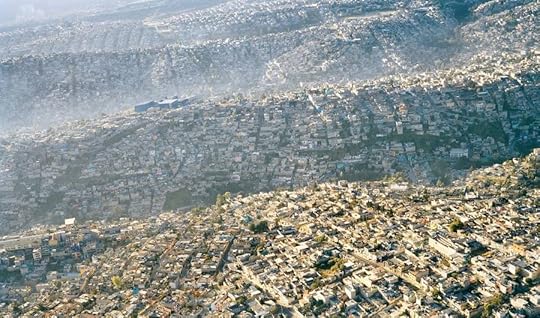 This is a disturbing analogy. However, it is very powerful. Homo Sapiens are without doubt a species in plague mode and it seems terribly likely that the biosphere will not survive the infestation.
This is a disturbing analogy. However, it is very powerful. Homo Sapiens are without doubt a species in plague mode and it seems terribly likely that the biosphere will not survive the infestation.



 This is a disturbing analogy. However, it is very powerful. Homo Sapiens are without doubt a species in plague mode and it seems terribly likely that the biosphere will not survive the infestation.
This is a disturbing analogy. However, it is very powerful. Homo Sapiens are without doubt a species in plague mode and it seems terribly likely that the biosphere will not survive the infestation.
Published on June 23, 2015 13:30
June 22, 2015
Aforementioned: aphorisms and questions for 2015
I we don't pay attention to our only home, the biosphere, it can kill us - in a season. 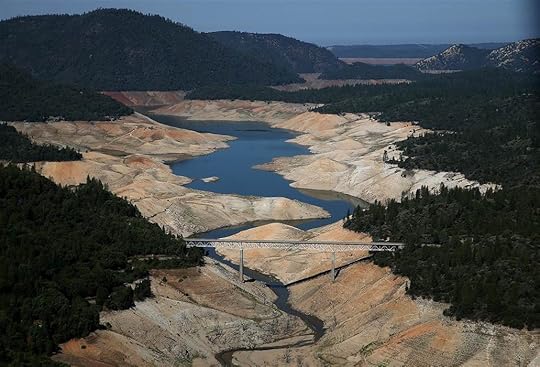

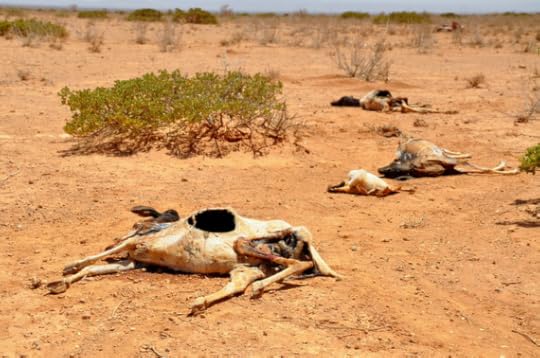
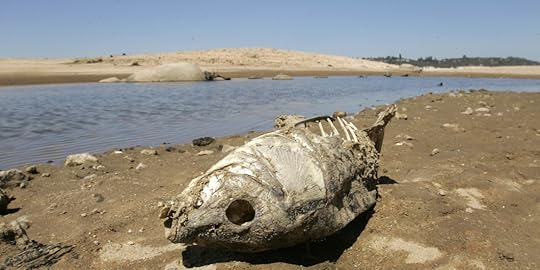 These horrible images come from the California drought. Is it terminal? Whatever the answer to that question the answer to a second question is much more certain. Who or what caused this terrible drought? We did, both globally and locally. Have people started to die of thirst in LA? Not yet; we will be sure to take whatever water resources we need from these hapless creatures to be sure that not one of us dies of thirst. Not yet. Our technology can give us a few more seasons.
These horrible images come from the California drought. Is it terminal? Whatever the answer to that question the answer to a second question is much more certain. Who or what caused this terrible drought? We did, both globally and locally. Have people started to die of thirst in LA? Not yet; we will be sure to take whatever water resources we need from these hapless creatures to be sure that not one of us dies of thirst. Not yet. Our technology can give us a few more seasons.



 These horrible images come from the California drought. Is it terminal? Whatever the answer to that question the answer to a second question is much more certain. Who or what caused this terrible drought? We did, both globally and locally. Have people started to die of thirst in LA? Not yet; we will be sure to take whatever water resources we need from these hapless creatures to be sure that not one of us dies of thirst. Not yet. Our technology can give us a few more seasons.
These horrible images come from the California drought. Is it terminal? Whatever the answer to that question the answer to a second question is much more certain. Who or what caused this terrible drought? We did, both globally and locally. Have people started to die of thirst in LA? Not yet; we will be sure to take whatever water resources we need from these hapless creatures to be sure that not one of us dies of thirst. Not yet. Our technology can give us a few more seasons.
Published on June 22, 2015 07:24
June 21, 2015
Aforementioned: aphorisms and questions for 2015
We make an imaginative contract with God the Father. Mother Nature's contract is tougher; it's tangible and exigent. 


 Whatever our faith, we need to address the realities of man and nature.
Whatever our faith, we need to address the realities of man and nature.



 Whatever our faith, we need to address the realities of man and nature.
Whatever our faith, we need to address the realities of man and nature.
Published on June 21, 2015 08:21
June 20, 2015
Aforementioned: aphorisms and questions for 2015
In Germany they've started a conversation about degrowth economy. In Canada let's make the restoration economy a federal election platform. @Degrowth_de
Published on June 20, 2015 07:51



